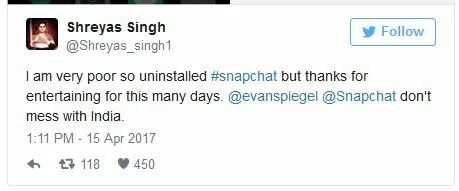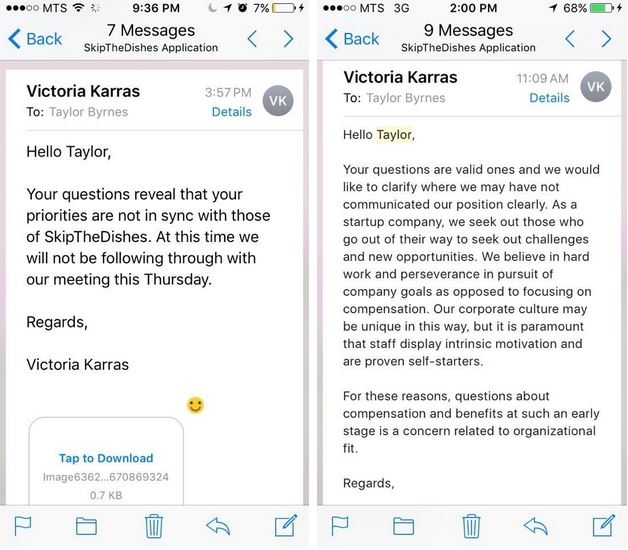Snapchat Is 'Only for Rich People'?
In 2015, did Snapchat founder Evan Spiegel say the app is "only for rich people" and that he didn't "want to expand into poor countries like India and Spain"? That's the claim by a former employee who is suing Snap Inc. for wrongful termination. Anthony Pompliano alleges he was fired after accusing the senior leadership team of inflating app metrics before the IPO.
Pompliano says the company falsely advertised the number of daily active users (DAU), violated a non-solicitation and non-compete agreement, and exaggerated growth and retention data. Pompliano claims that Speigel's response about poor countries came when he suggested going into international markets to expand the user base.
A representative for Snap responded:
"This is ridiculous. Obviously, Snapchat is for everyone! It's available worldwide to download for free. Those words were written by a disgruntled former employee. We are grateful for our Snapchat community in India and around the world."
Snap doesn't deny data discrepancies, but says they aren't as significant as Pompliano claims. Pompliano contends that the discrepancies indicate "a wide-spread, systemic failure in Snapchat's internal controls over its user data." A Fortune article warns that questions about user registrations and engagement could be important to investors, who bought stock in what Fortune calls a "giant IPO" that "just proved we're in a tech bubble."
Discussion:
- Let's assume Spiegel made those comments. Do you find them offensive, taken out of context, or something else?
- How well did Snap handle the response?
- How serious are Pompliano's claims? What effect, if any, do you think they might have on investors?
Barclays Chief Tries to Find Whistleblower
 The Guardian used the word "hunt" to describe Jes Staley's search for an employee who tried to communicate anonymously with the board of directors to file a complaint about another employee. As the chief executive of Barclays, Staley tried to track down the author of the two letters and received help from internal security employees and a U.S. law enforcement agency.
The Guardian used the word "hunt" to describe Jes Staley's search for an employee who tried to communicate anonymously with the board of directors to file a complaint about another employee. As the chief executive of Barclays, Staley tried to track down the author of the two letters and received help from internal security employees and a U.S. law enforcement agency.
In an email to employees, Staley explains his rationale for going after the whistleblower:
"One of our colleagues was the subject of an unfair personal attack sent via anonymous letters addressed to members of the Board and a senior executive of Barclays. The allegations related to personal issues from many years ago, and the intent of the correspondents in airing all of this was, in my view, to maliciously smear this person."
As a result of an internal investigation, Barclays officials said, Staley acted "honestly but mistakenly." He may, however, receive a smaller bonus. We also may learn more: three regulatory groups are investigating the matter.
Discussion:
- Read Staley's email to employees. What's your interpretation of his perspective? To what extent do you see his perspective?
- What should the board of directors do at this point?
United Drags a Man Off the Plane
I'm not sure United thought this one through; people have cell phones. The airline needed to free up four seats so their employees could to get to Louisville. Attendants offered $400 and $800 but couldn't get people to relinquish their spots. Four people on the plane were approached; three left "without incident," as The New York Times reports.
But the fourth wouldn't budge. He said, "I'm not getting off the plane. I'm a doctor; I have to see patients in the morning." The Times reports the airline's perspective:
Charlie Hobart, a United spokesman, said in a telephone interview on Monday that "we had asked several times, politely," for the man to give up his seat before force was used.
"We had a customer who refused to leave the aircraft," he said. "We have a number of customers on board that aircraft, and they want to get to their destination on time and safely, and we want to work to get them there. "Since that customer refused to leave the aircraft, we had to call" the police, and they came on board, he said.
The man was removed by force, dragged down the aisle, and eventually carried out on a stretcher. A video shows the man, somehow, back on the plane, clearly upset, saying, "I have to go home." In this video, we see that his mouth is bleeding.
United issued a short statement from CEO Oscar Munoz on Twitter. Although Munoz apologizes for "re-accommodating" passengers, no public apologies have been made to the man or other passengers as yet.
UPDATE: Munoz issued a longer statement and, as NBC News tweeted, "found new words like 'disturbed' and 'horrific event'":
"The truly horrific event that occurred on this flight has elicited many responses from all of us: outrage, anger, disappointment. I share all of those sentiments, and one above all: my deepest apologies for what happened. Like you, I continue to be disturbed by what happened on this flight and I deeply apologize to the customer forcibly removed and to all the customers aboard. No one should ever be mistreated this way."
Spokesperson Megan McCarthy also said, "We recognize that our response yesterday did not reflect the gravity of the situation," Ms. McCarthy said. "And for that we also apologize. Our focus now is looking ahead and making this right. Judging from a letter Munoz sent to his employees, he may have been supporting them, protecting them. But customers must come first in a situation like this. Meanwhile, the passenger, Dr. Dao, has hired lawyers, four senior senators wrote United a chastising letter, and the company has lost $255 million in value. What may be worse (or perhaps, all for the best) are grumblings about potential disruptors for the commercial airline industry.
Discussion:
- What leadership lessons would you like to teach United's staff? What crisis communications lessons could they learn?
- Where did the airline go wrong? Try to identify all steps in the process.
- What's your view of the response so far? Should United say more?
Wells Fargo Blames a Manager
An investigation led by Wells Fargo's board into the practices that led to thousands of false accounts blames Carrie Tolstedt, the former head of the retail division:
The root cause of sales practice failures was the distortion of the Community Bank's sales culture and performance management system, which, when combined with aggressive sales management, created pressure on employees to sell unwanted or unneeded products to customers and, in some cases, to open unauthorized accounts.
The report also says the former CEO John Stumpf was "too slow" to investigate possible issues. The report is public on Wells Fargo's website.
Tolstedt's lawyers dispute the allegations. Stumpf once referred to Tolstedt as the "best banker in America." Reuters reported:
Tolstedt was perceived by high-level employees as having the support of Stumpf, with whom it was considered best to avoid raising problems with.
"Stumpf was ultimately responsible for enterprise risk management at Wells Fargo, but was not perceived within Wells Fargo as someone who wanted to hear bad news or deal with conflict," the report said.
Duke Law School Professor James Cox told Reuters, "There's a tremendous amount of pressure from regulators to throw someone under the bus. If they don't, then Wells Fargo is going to be even more in the crosshairs."
In a statement, "Wells Fargo Statement Regarding Board Investigation into the Community Bank's Retail Sales Practices," CEO and President Tim Sloan summarized actions the bank has taken: // <![CDATA[ // <![CDATA[ // <![CDATA[ // <![CDATA[ // if this line executes, then javascript is turned on and we'll therefore remove the no-js class from the HTML tag document.documentElement.className = document.documentElement.className.replace(/(^|\s)no-js(\s|$)/, '$1$2'); // ]]> // ]]> // ]]> // ]]</p></div>
Penn State Trustee Resigns After Putting Foot in Mouth
Five or so years after the scandal at Penn State involving a football coach, young boys, and an inactive Administration, the university is still in the news for bad behavior. Former coach Jerry Sandusky was convicted of rape and child molestation and is serving prison time. You may remember that Joe Paterno was also accused of cover-ups, but he died of cancer soon after the scandal broke and he was dismissed from the university.
Last week, the former university president, Graham Spanier, was convicted of child endangerment. FBI director Louis Freeh wrote in a report that for more than 12 years, Spanier and other Administrators, "actively protected a notorious pedophile who inflicted irreparable harm on countless child victims on the campuses and locker rooms at PSU. Although these men had multiple opportunities to stop this vicious, serial predator from continuing to sexually assault children who trusted the PSU campuses and programs as safe havens, they decided together to protect this monster rather than report him to the police."
After the verdict, one of the Penn State trustees, Albert L. Lord, said, "Running out of sympathy for 35 yr old, so-called victims with 7 digit net worth," and "Do not understand why they were so prominent in trial. As you learned, Graham Spanier never knew Sandusky abused anyone."
Lord has since resigned from the board, and it's unclear whether he was asked to leave. He also issued an apology statement.
Discussion:
- If the board of trustees didn't ask Lord to resign, should they have?
- Analyze Lord's statement. How well does this work to explain the comment, apologize, and rebuild Penn State's image?
Infographic Gets Panned on Twitter
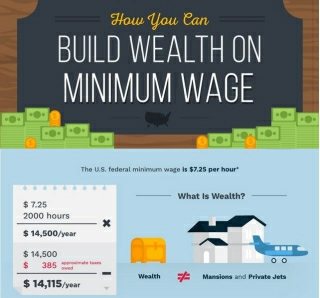 InvestmentZen, which encourages financial independence, created an infographic with advice for living on minimum wage, currently $7.25 per hour. Suggestions include selling your car, moving to a less expensive city, and recognizing that "a lot of the best things in life are free."
InvestmentZen, which encourages financial independence, created an infographic with advice for living on minimum wage, currently $7.25 per hour. Suggestions include selling your car, moving to a less expensive city, and recognizing that "a lot of the best things in life are free."
Reactions are generally not positive. Twitter users are taking offense at some of the advice, pointing out that, for example, not everyone has the flexibility to move across country. Part of the infographic identifies "excuses" for not moving, including "All of my friends and family live here." Sounds like a good reason to stay put to me, particularly for people living in poverty or close to it.
Others on the Twitter thread note the missing expenses of moving, doing laundry, and children should anyone choose to have them. An obvious logical flaw is in suggesting people sell their car, yet suggesting picking up some Uber shifts.
This reminds me (and others) of a 2013 McDonald's website with advice to employees, including getting a second job. To help employees manage expenses, the site showed a sample monthly budget with $25 for health insurance. McDonald's pulled the site and published this statement:
We have offered the McResource program to help our valued McDonald's employees with work and life guidance created by independent third party experts. A combination of factors has led us to re-evaluate, and we've directed the vendor to take down the website. Between links to irrelevant or outdated information, along with outside groups taking elements out of context, this created unwarranted scrutiny and inappropriate commentary. None of this helps our McDonald's team members. We'll continue to provide service to our folks through an internal telephone help line, which is how the majority of employees access the McResource services.
Discussion:
- Analyze the full infographic. What visual and organizational design principles from Chapter 9 in the text are used?
- What other logical flaws can you identify?
- Overall, do you find the advice useful, or does it enrage you as it does some Twitter users? Should InvestmentZen pull the infographic and issue a statement as McDonald's did in 2013?
Applicant Asks About Salary and Employer Cancels Interview

 It was a tough lesson for Taylor Byrnes, looking for a menu developer position in Winnepeg. After a phone interview and before an in-person interview, she dared to ask her prospective employer, food delivery service SkipTheDishes, about wages and benefits. The company didn't appreciate the questions and cancelled the interview.
It was a tough lesson for Taylor Byrnes, looking for a menu developer position in Winnepeg. After a phone interview and before an in-person interview, she dared to ask her prospective employer, food delivery service SkipTheDishes, about wages and benefits. The company didn't appreciate the questions and cancelled the interview.
After the predictable outrage on Twitter, co-founder Joshua Simair said in a statement, "The email sent to Taylor was wrong and does not represent our team's approach or values," and "We are very disappointed in how it was handled. We do share a compensation package prior to hiring. As soon as we became aware of it on Monday, we reached out to Taylor to apologize for the email and reschedule her interview."
- Your thoughts? It typically is considered poor form to ask about salary on a first interview, but what about this situation? Did Byrnes behave badly? Did she make the situation worse with her posts on social media and therefore get what she deserved?
- How well did SkipTheDishes respond? Should they have done something else?
- Would you offer Byrnes the job if she's qualified? How easily can she and the HR staff get past this?
Germany Proposes to Fine Companies for Illegal Content
 The German government wants to fine Google, Facebook, and other social media sites if they don't remove "hate speech, fake news and other undesirable content" within 24 hours if it's considered "blatantly illegal" and within seven days if it's otherwise considered to be breaking the law.
The German government wants to fine Google, Facebook, and other social media sites if they don't remove "hate speech, fake news and other undesirable content" within 24 hours if it's considered "blatantly illegal" and within seven days if it's otherwise considered to be breaking the law.
A Politico article describes the decision:
"Facebook and Twitter missed the chance to improve their takedown practices," said Heiko Maas, federal minister for justice and consumer protection. Maas claimed social media networks don't take complaints seriously. "For companies to take on their responsibility in question of deleting criminal content, we need legal regulations."
According to one study, Facebook removed 33% of illegal posts within 24 hours so far this year-not enough for some critics-and Twitter did worse, removing only 1% within 24 hours. The social media companies argue that policing negative activity is nearly impossible given the volume of posts on their sites.
In Twitter's defense (it needs one), the company has published extensive policies, including those related to "Hateful Conduct." But bullying, threats of violence, and other misconduct have been an issue for Twitter since the beginning and continue to plague the site's credibility.
In related hate-speech news, AT&T, Johnson & Johnson, and other big companies are pulling ads on YouTube because they don't want them appearing next to inappropriate content. This is another, perhaps more effective, way to get the social media sites to take action.
Discussion:
- What's your view of Germany's proposed law: reasonable, necessary, unrealistic, or something else?
- What effect do you think such a law would have on the social media sites? How about its users?
Tillerson Had an Alias Email at Exxon
 New Secretary of State Rex Tillerson had an alias email address when he was CEO of Exxon and used it to discuss climate change issues. New York Attorney General Eric Schneiderman discovered the account-and 34 others-while investigating Tillerson on potentially misleading statements about climate change.
New Secretary of State Rex Tillerson had an alias email address when he was CEO of Exxon and used it to discuss climate change issues. New York Attorney General Eric Schneiderman discovered the account-and 34 others-while investigating Tillerson on potentially misleading statements about climate change.
Company spokesman Alan Jeffers says Tillerson did nothing wrong and set up the account because his primary email was overloaded:
"The email address, Wayne.Tracker@exxonmobil.com, is part of the company's email system and was put in place for secure and expedited communications between select senior company officials and the former chairman for a broad range of business-related topics."
"This was not an alias used to discuss only climate change. It was an account used for everyday business by senior executives who needed to reach."
Wayne is Tillerson's middle name, and Tracker may be relevant to his past involvement with the Boy Scouts of America.
Discussion:
- Do you believe Exxon's argument that nothing is wrong here? Why or why not?
- Should Exxon have disclosed the account during the lawsuit? They did reveal the email address but didn't connect it to Tillerson.
- If the company did create the account, and Tillerson used it for "confidential" conversations, why do you think Tillerson and Exxon thought they could get away with this: arrogance, niavety, desperation, or something else?
Monsanto Emails Reveal Company's Potential Influence over Cancer Studies
 A key ingredient, glyphosate, in weedkiller Roundup may cause cancer, and emails from Monsanto employees put the company's role in cancer research into question. According to a Dow Jones news report, "Emails among company employees, released this week as part of a continuing lawsuit over the herbicide, reflect what the plaintiffs' attorneys say was the company's inappropriate role in shaping research and a cozy relationship with regulators at the U.S. Environmental Protection Agency. Monsanto argued the emails were taken out of context."
A key ingredient, glyphosate, in weedkiller Roundup may cause cancer, and emails from Monsanto employees put the company's role in cancer research into question. According to a Dow Jones news report, "Emails among company employees, released this week as part of a continuing lawsuit over the herbicide, reflect what the plaintiffs' attorneys say was the company's inappropriate role in shaping research and a cozy relationship with regulators at the U.S. Environmental Protection Agency. Monsanto argued the emails were taken out of context."
An EPA toxicologist, who had cancer, concluded that "it is essentially certain that glyphosate causes cancer." She wrote an impassioned letter to EPA Deputy Division Director Jess Rowland in 2013 highlighting the negative effects of the chemical.
Perhaps the most damning evidence is a Monsanto email summarizing a phone conversation with Rowland, which implies that the EPA is trying "kill" evidence of glyphosate causing cancer:
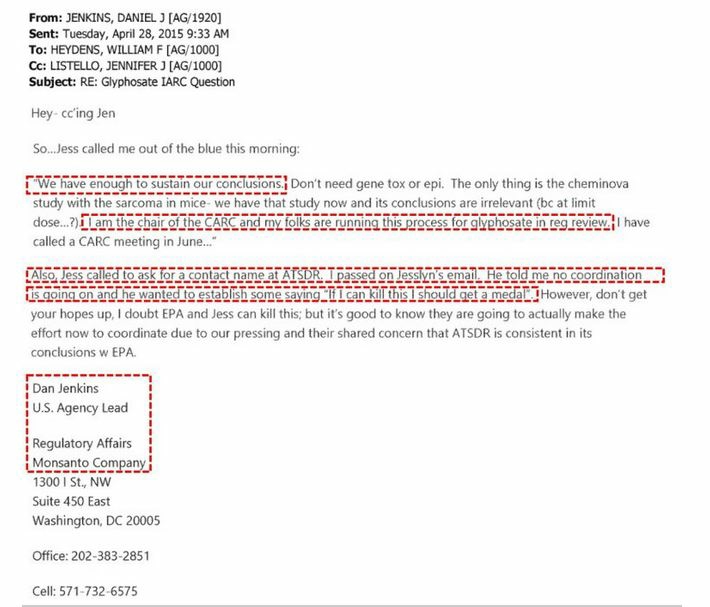
In addition, Monsanto's own lead toxicologist wrote in a 2009 email and confirmed in a recent deposition, "you cannot say that Roundup does not cause cancer … we have not done carcinogenicity studies with ‘Roundup.'"
Discussion:
- Once again, let's help companies avoid legal trouble with email. What should Monsanto have done differently?
- Of course, email isn't to blame, but the company and EPA may be. What went wrong here?
Cancer Research Scientist Faces Credibility Questions
What The New York Times calls "years of ethics charges" have plagued a cancer researcher, but new problems may be his final undoing. Dr. Carlo Croce, at Ohio State University, has brought in $86 million in federal grants, but the Times reports, "he overstated his expansive claims for the therapeutic promise of his work, and that his laboratory is focused more on churning out papers than on carefully assessing its experimental data."
David A. Sanders, a virologist at Purdue University, has called out more than 20 of Croce's papers claiming falsified data: "It's a reckless disregard for the truth."
In a nifty, interactive visual, The New York Times shows how Croce's work was manipulated in one journal article. If you look closely, you see that a bright line is disjointed, warning that some copying and pasting took place. Indeed, samples 6, 7, and 8 are identical to 3, 4, and 5.
Also questionable is Croce's work as an advisor to the Council for Tobacco Research. Although Croce says he believes smoking causes lung cancer, the Council has used his work to prove otherwise.
One of the biggest questions is the role of Ohio State University: did the administration dismiss charges that should have been more seriously considered? The University responded to the article in a short opinion letter, concluding, "While the review is still underway, the independent experts have found that our policies meet with national research compliance standards. They have also found no evidence that Ohio State deviated from those policies in reviewing allegations of research misconduct."
Discussion:
- Read the NYT article. What do you believe are the most egregious claims against Croce?
- Look online for other examples of image manipulation in scientific journals. Should peer-review journals be more vigilant in catching these falsifications? Or are they too difficult to judge?
- Analyze the University's opinion letter. Which parts do you find most and least convincing?
Supporting a Claim with Evidence
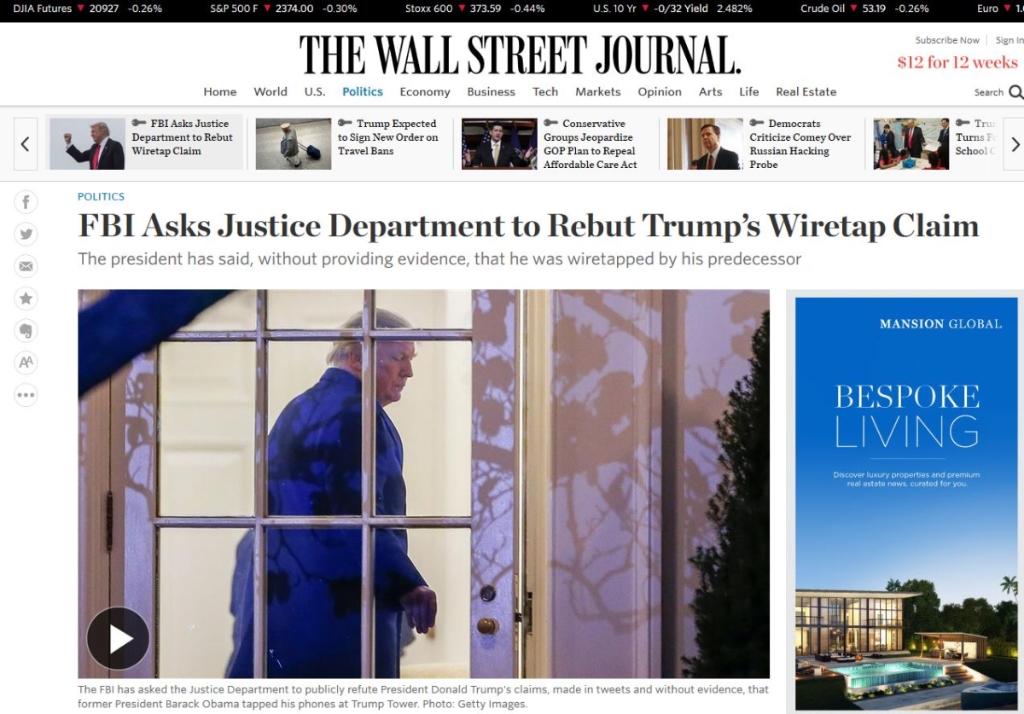 Business Communication students learn the importance of supporting claims with evidence in order to persuade an audience. President Trump's claim that former President Obama wiretapped his phone is being questioned by many reporters and the FBI.
Business Communication students learn the importance of supporting claims with evidence in order to persuade an audience. President Trump's claim that former President Obama wiretapped his phone is being questioned by many reporters and the FBI. 
FBI Director James Comey, in the news most recently for identifying more of Hillary Clinton's emails days before the election, seemingly without evidence, has asked the Justice Department to rebut the President's claims and to deny an investigation. This is an extraordinary request because, as The New York Times reports, this action "would be a major rebuke of a sitting president."
The Times also traces the claim, which started on a conservative radio show:
It began at 6 p.m. Thursday as a conspiratorial rant on conservative talk radio: President Barack Obama had used the "instrumentalities of the federal government" to wiretap the Republican seeking to succeed him. This "is the big scandal," Mark Levin, the host, told his listeners.
That was enough for President Trump to tweet his disgust.
I sometimes compare headlines in The New York Times and The Wall Street Journal. Today, they are both running this story as front page news, and even the more conservative WSJ says President Trump made this claim without evidence. The subtitle reads, "The president has said, without providing evidence, that he was wiretapped by his predecessor."
Discussion:
- What's your view of the president's response? Is it hasty, or did he have enough to go on?
- What should the Justice Department do with the president's request and James Comey's recommendation?
- What's the danger of the president's accusation? What if he's wrong? On the other hand, what's the danger of ignoring the potential violation? What if he's right?
Analyzing Trump's Tone in Speeches
How would you describe Trump's tone in his speeches? A New York Times article explains how sentiment analysis was used to compare his speeches over time and to other State of the Union addresses:
"That's according to a sentiment analysis of past speeches, which categorizes words according to several dimensions. Mr. Trump's campaign speeches used a high proportion of words associated with "anger" - like fight, illegal or bad - and a relatively low proportion of words with positive associations - like build, freedom or peace."

Sentiment analysis aside, his tone changes are pretty obvious. The best way I can describe his State of the Union address is "measured." He also gestured less and read more from the teleprompter-perhaps acting more presidential than we have seen him in less formal settings.
The Washington Post compiled the address "in 3 minutes." Of course, the compilation and the "winners and losers" identified by the author/editor are based on his own thinking about Trump/s plans and communications.
Discussion:
- How would you describe President Trump's tone in his State of the Union address? What, if anything, surprised you about the speech?
- The president certainly is adjusting to the audience and purpose of his speeches. Compare audiences for his campaign speeches and his official speeches as president. What are his objectives for each?
- With which of The Washington Post's conclusions do you agree and disagree? The author also refers to the speech as "strong." What do you think he means by this, and do you agree or disagree?
Communication Failures at the Oscars
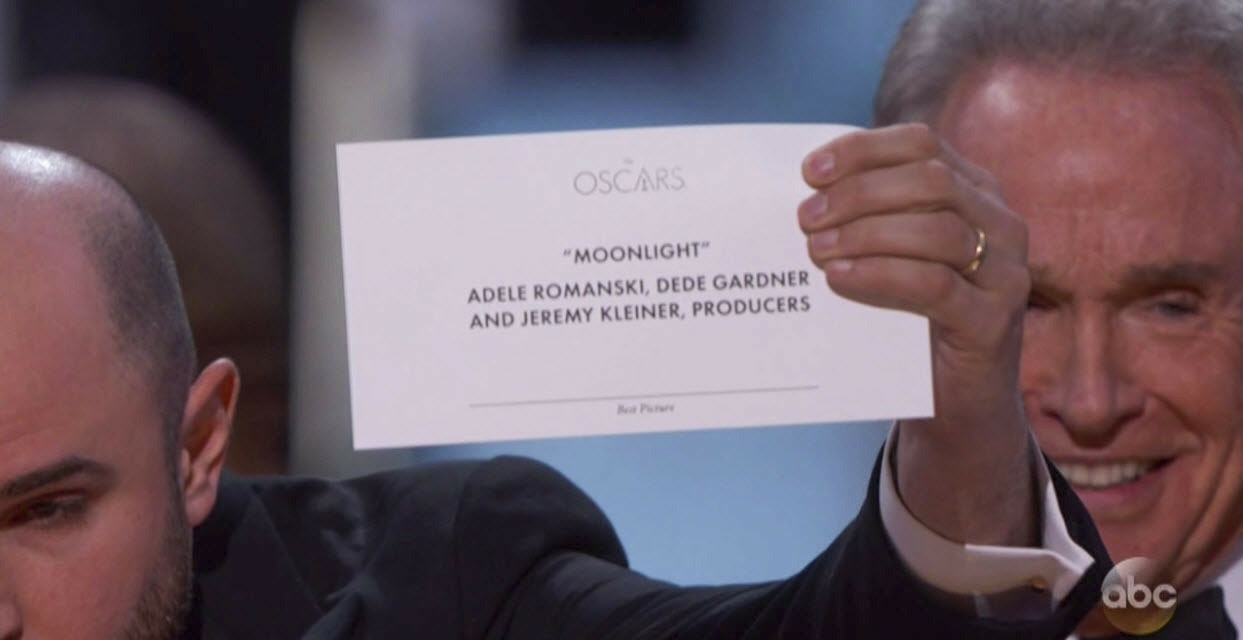 The RIGHT envelope, please! The Academy Awards suffered embarrassment at this year's event when the wrong winner was announced as Best Picture. Several communication failures caused the problem:
The RIGHT envelope, please! The Academy Awards suffered embarrassment at this year's event when the wrong winner was announced as Best Picture. Several communication failures caused the problem:
- The first and most critical error was PwC's responsibility: the wrong envelope was given to announcers Warren Beatty and Faye Dunaway.
- Beatty opened the card and saw "Emma Stone, La La Land." He hesitated and passed the card to Dunaway.
- Dunaway confidently announced the winner: "La La Land!" She didn't question it either.
- The La La Land folks came on stage and gave three acceptance speeches. They were stopped, but it took too long and could have saved further embarrassment.
- La La Land Producer Marc Platt said, "This is not a joke. They read the wrong thing." But this puts the blame entirely on the announcers, when the original error is the wrong envelope. Of course, Platt didn't know what happened, and he was trying to be gracious about the fiasco.
- PwC wrote a short statement, promising an "investigation," which is probably overstated: "We sincerely apologize to 'Moonlight,' 'La La Land,' Warren Beatty, Faye Dunaway, and Oscar viewers for the error that was made during the award announcement for Best Picture. The presenters had mistakenly been given the wrong category envelope and when discovered, was immediately corrected," the company said. "We are currently investigating how this could have happened, and deeply regret that this occurred."
Discussion:
- What could have been done differently during each step of this mistake?
- Should PwC say something different? The company has had the Oscars account for 83 years. Should the organization fire them? Why or why not?
More Ethical Questions for Uber
 Susan Fowler, a former Uber engineer, has blasted the company for what she describes as sexual harassment, a sexist environment, and HR's failure to respond. Fowler also reports that only 3% of engineers are women at Uber, which she claims has fallen over time.
Susan Fowler, a former Uber engineer, has blasted the company for what she describes as sexual harassment, a sexist environment, and HR's failure to respond. Fowler also reports that only 3% of engineers are women at Uber, which she claims has fallen over time.
When she reported sexual harassment, she was given a choice to move to another department or stay and likely receive a poor performance review. This is a basic "don't" in HR, from my experience: you don't move the victim and put him or her at a disadvantage. According to Fowler, no further action was taken in the case, although other women received similar treatment by the same manager.
At this point, Fowler's complaints are getting attention. CEO Travis Kalanick wrote that he would look into the situation:
"I have just read Susan Fowler's blog. What she describes is abhorrent and against everything Uber stands for and believes in. It's the first time this has come to my attention so I have instructed Liane Hornsey our new Chief Human Resources Officer to conduct an urgent investigation into these allegations. We seek to make Uber a just workplace and there can be absolutely no place for this kind of behavior at Uber -- and anyone who behaves this way or thinks this is OK will be fired."
Ariana Huffington, an Uber board member, jumped into the conversation on Twitter:
From interviews and messages from Uber employees, a New York Times article reports an "aggressive, unrestrained workplace culture." Kalanick further addressed the controversy in an email to employees that begins: "It's been a tough 24 hours. I know the company is hurting, and understand everyone has been waiting for more information on where things stand and what actions we are going to take."
Discussion:
- Read Fowler's blog post. What persuasive strategies does she use (logical arguments, emotional appeals, and credibility)? Which parts are most and least convincing?
- How should the company respond? An investigation is a good start: what should this include, how should it be carried out, and what result would you expect?
Milo Yiannopoulos Loses Speaking Engagement and Book Deal
 Milo Yiannopoulos has an active following for the very reason he lost a speaking engagement and book deal: he's out there. A New York Times article refers to him as "a polemical Breitbart editor and unapologetic defender of the alt-right," and he seems to say whatever he wants, which isn't a bad thing-until it is.
Milo Yiannopoulos has an active following for the very reason he lost a speaking engagement and book deal: he's out there. A New York Times article refers to him as "a polemical Breitbart editor and unapologetic defender of the alt-right," and he seems to say whatever he wants, which isn't a bad thing-until it is.
Earlier this month, a college tour at UC Berkeley was canceled when protests ended in violence, and today, he lost the chance to speak at the Conservative Political Action Conference. The latest controversy comes from a video in which Yiannopoulos seems to condone pedophilia. Yiannopoulos denies the allegations and "blamed 'British sarcasm' and 'deceptive editing,'" according to the Times.
Simon & Schuster canceled plans for his book, "Dangerous." In a statement, Yiannopoulos said, "The people whose views, concerns and fears I am articulating do not sip white wine and munch canapés in gilded salons. And they will not be defeated by the cocktail set running New York publishing. Nor will I."
According to the Times article, Yiannopoulos's position at Breitbart is under consideration:
Mr. Yiannopoulos, who has railed against Muslims, immigrants, transgender people and women's rights, is a marquee contributor to Breitbart News, where he serves as senior editor. He has amassed a fan base for his stunts and often-outrageous statements. But by Monday afternoon, his future at the website was being intensely debated by top management.
One Breitbart journalist, who requested anonymity to describe private deliberations, described divisions in the newsroom over whether Mr. Yiannopoulos could stay on. There was some consensus among staff members that his remarks were more extreme than his usual speech, the journalist said, and executives were discussing by telephone whether his apology was enough to preserve his position at the site.
[Update: Yiannopoulos resigned from his Breitbart position.]
I saw Yiannopoulos for the first time on "Real Time with Bill Maher." What struck me most was this statement: "Mean words on the internet don't hurt anyone." Really? Who gets to decide?
Discussion:
- Did the organizers of the Conservative Political Action Conference and Simon & Schuster make the right decision? Did UC Berkeley?
- What's your perspective on Yiannopoulos' comment, "Mean words on the internet don't hurt anyone"? Who does get to decide?
Former Starwood Exec Comments on the Acquisition
 Former head of global development at Starwood Hotels & Resorts Worldwide Simon Turner talks openly at The Americas Lodging Investment Summit (ALIS) conference. In an interview, Turner acknowledges that in any acquisition, like the Marriott's purchase of Starwood, not everyone is going to still have a job.
Former head of global development at Starwood Hotels & Resorts Worldwide Simon Turner talks openly at The Americas Lodging Investment Summit (ALIS) conference. In an interview, Turner acknowledges that in any acquisition, like the Marriott's purchase of Starwood, not everyone is going to still have a job.
Turner discusses the uncertainly, particularly with the last-minute bid from Anband Insurance, and the value of overcommunicating to avoid confusion.
Turner also describes the process and his feelings of attachment towards the people in his organization, which helped him avoid feeling "woe is me." He also had perspective considering some people spent their entire career at Starwood compared to his nine years.
In talking about the hotel business, Turner says, although executives compete with each other, there is a sense of camaraderie and respect, which Turner calls "one of the great things about our business."
Discussion:
- What does Turner mean at the beginning when he jokes, "I'm a cost synergy"?
- What lessons can we learn from Turner's views on communication?
- What's your view of Turner's perspective on the hotel business? Do you think this is true of some industries more than others? Why or why not?
Fallacies in Recent Politics
 I'm teaching a module on fallacies on Monday and will present a few related to politics-wish me luck:
I'm teaching a module on fallacies on Monday and will present a few related to politics-wish me luck:
- Ad hominen: President Trump's tweets are an obvious example, but I'll use Hillary Clinton's "basket of deplorables" for this example. It's an attack without evidence.
If it's not too charged (and a bit complicated), I may talk about Senator Elizabeth Warren's reading of Coretta Scott King's 1986 letter about Jeff Sessions, the attorney general nominee. An LA Times opinion piece explains the ad hominen issue well:
"The original intent of the rule, if you will, was to preserve comity and focus the attention senators on substance rather than ad hominem arguments. But Warren was commenting on Sessions not as a colleague but as the nominee to a position in the executive branch; his character (as perceived by Mrs. King) was central to her argument."
- False analogy: This one will be a question to students. Nordstrom dropped Ivanka Trump's brand, and President Trump criticized the decision on Twitter (although The Wall Street Journal reports a 32% sales decline). This may have been an ethics violation itself, but the false analogy came in the reporting. Kellyanne Conway was charged with an ethics violation for, as a member of the White House staff, promoting Ivanka Trump's products on Fox & Friends:
"Go buy Ivanka's stuff, is what I was [saying] - I hate shopping and I'm going to go get some myself today."
"This is just...it's a wonderful line. I own some of it... I'm going to give a free commercial here. Go buy it today, everybody. You can find it online."
A Breitbart article agrees with the charges, but is this "wildly disproportionate"? The article discusses a SiriusXM interview and includes a few comparisons to democrats' promoting for-profit companies:
"Obama administration directly involved government in vastly larger business dealings, most dramatically by using the Internal Revenue Service to force Americans to buy products from preferred insurance companies under Obamacare."
"President Obama's pushing green energy technology and electric cars, such as the Chevy Volt."
"...Clintons' case...pushing the Clinton Foundation and using their government power to get people to donate to the Clinton Foundation as a form of quasi-bribery."
Are Verizon and T-Mobile Going Too Far on Twitter?
 T-Mobile's sex-themed commercial continued on Twitter with the company trading barbs with Verizon, the ad target. Actress Kristen Schaal stars in the ad and seemed to enjoy being "punished" by Verizon for going over her data plan.
T-Mobile's sex-themed commercial continued on Twitter with the company trading barbs with Verizon, the ad target. Actress Kristen Schaal stars in the ad and seemed to enjoy being "punished" by Verizon for going over her data plan.
Some thought the ad was cute, but the tweets seemed to get out of hand. A Mashable article sums it up well: "It was all pretty creepy coming from the marketing departments of two of America's biggest telecoms. And most Twitter users were not having it." Tweets encouraged the companies to end it:
- "K guys. This has OFFICIALLY gone too far."
- "50 Shades of Don't"
T-Mobile CEO John Legere is known for some outlandish behavior. A CNBC article this month calls his behavior "authentic," for example using the "f-bomb," and Legere explains why he is the way he is:
"The trick for me is, I really believe that I act, behave, and speak the same way my customers do. I say what they think on behalf of them. If you look, most of my colorful nature and antics is to drive change that benefits customers."
Discussion:
- Do you find the commercial itself funny?
- What's your view of the ongoing exchange between Verizon and T-Mobile? In this case, was it worth the risk of offending?
NFL Rejects GNC Ad
 GNC, the vitamin store company, is trying to improve its image, but the company won't get a spot in this year's Super Bowl. Although Fox News accepted the ad, the NFL pulled the plug.
GNC, the vitamin store company, is trying to improve its image, but the company won't get a spot in this year's Super Bowl. Although Fox News accepted the ad, the NFL pulled the plug.
According to AdAge, "Jeff Hennion, exec VP-chief marketing and e-commerce officer at GNC, said the NFL objected to its commercial because fewer than 3% of its products include two of the 162 substances banned by the league. According to Mr. Hennion, the NFL has approval rights over commercials in the big game." NFL also wanted GNC to change its logo, which has the name on a pill bottle. The company was working on that, but the commercial was still rejected.
Discussion:
- Why do you think the NFL rejected GNC's ad? Is it about the banned substances or something else? Related question: What's your view of the ad?
- I can't find a statement from the NFL. Should the company make a comment? What are the advantages and potential downsides?
- GNC makes an interesting argument with the 3% claim. Do you find it convincing? Consider principles from Chapter 9.



